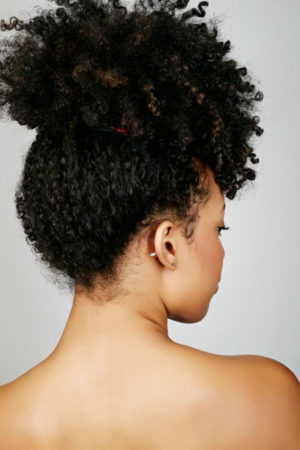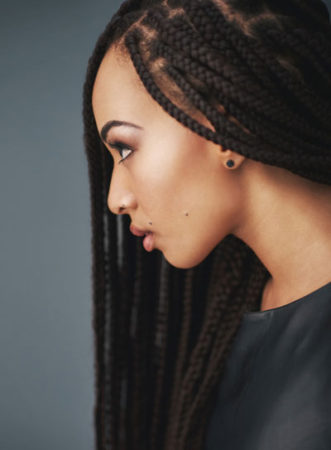The chillier months of the year tend to be extra harsh on natural hair and the scalp.
The traditional method is to wrap your locks up in braids,a weave or any other protective style that will give your ends a break from breakage, splitting and drying. But let’s get back to basics and start with scalp maintenance.
ALSO SEE: 6 Ways To Age-Proof Your Hands And Nails This Winter
Scalp Savers:
- Boost the moisture on your scalp by using hair oils. Avoid products that are petroleum based,these can clog the pores on your scalp and causes blockages.
- It’s extremely important to use a deep conditioner after your regular shampoo treatment. Sulphate-free products are less drying on natural hair and easy on the scalp.
- Avoid any styling that will lift the roots of the hair or pull at the hair. If you have is dry strand it’s likely to break at the roots from tugging.

If your hair is fragile or dry, avoid styles like this high ponytail
- Low maintenance styles are best suited when hair is dry and fragile. E.g. low ponytails that are not tight on the scalp.
- Protect your hairline by asking your stylist to give you bangs with your weave, that way allowing your locks to breathe in the front and not get pulled back tightly. The same goes for the nape of your neck. The tracks of your weave don’t have to be stretched to the nape, do this to prevent breakage.
- If you opt to wear your tresses in braids ensure that when the extensions are being plaited onto the hair,the density of the hair fed into the braid equals the hair, so that the braid isn’t too heavy on the strands, this is especially important when it comes to styles such as box braids and thicker cornrows.
- Protective styles such as braids,especially micro braids which tend to be of a smaller density should not be kept in for longer than 6 weeks. For many people, the hair will start to lock after this period, split and break at the ends, causing very uneven damage and defeating the purpose of the style being protective.
- Spray braids daily with a braid moisturising spray or a detangling spray, to prevent matting or locking of your hair.

Remember to moisturise your braids with sprays
- For extra dry locks use the co-wash method, which involves skipping the process of washing with a shampoo and going directly to washing your hair with conditioner. This usually assists with moisture and elasticity.
- Natural oils like organic coconut oil, shea butter and castor oil – which are known to be safe and harm free – are amazing lubricants for your strands and scalp. These can be applied at your discretion.
- Castor oil is also used to repair any loss and can be massaged into the necessary areas, while also promoting needed blood flow to the problem area. Castor oil is a key ingredient in many hair loss products sold in supermarkets and pharmacies.

- If you wear an afro, your winter solution is cornrows that aren’t too tight. If you have extensions which are added with plaits to add volume, ask your stylist to not start the extensions at the base of the scalp; therefore, preventing pulling of the hairline. Moisturise your afro as often as required with light oils or a moisturising spray that won’t leave flaked or residue.
PLUS: The Best Products For Your Afro
Words by Thami Kwazi
Disclaimer: The information provided within this site is strictly for the purposes of information only and is not a replacement or substitute for professional advice.

